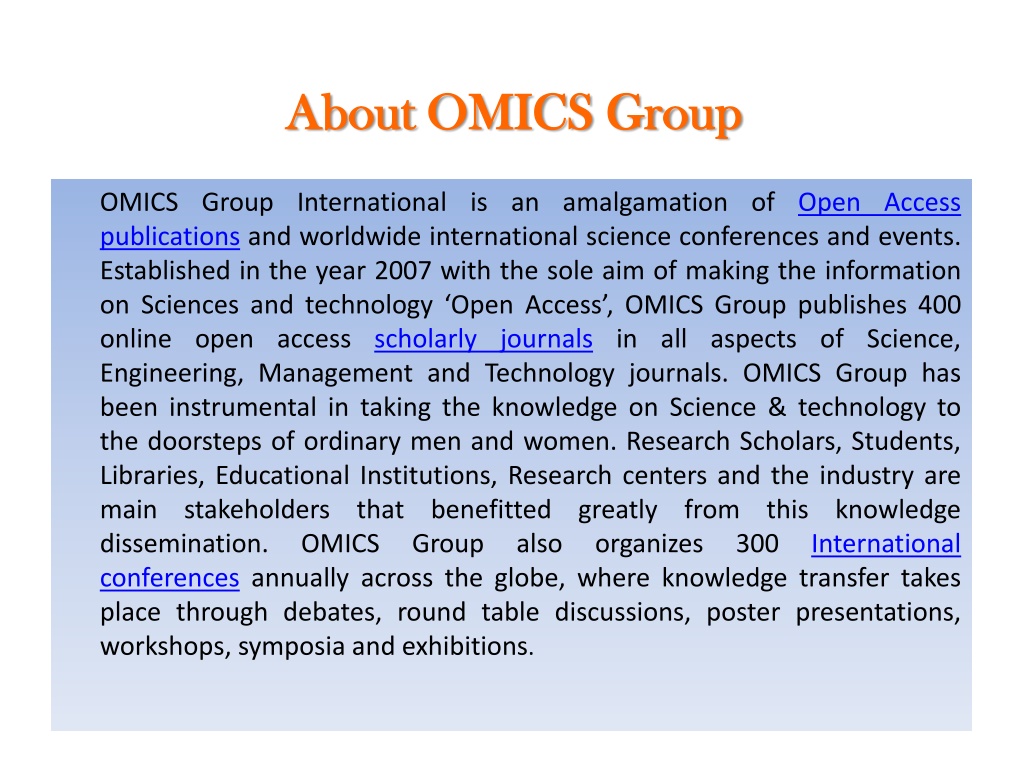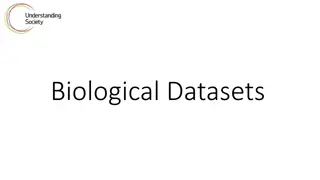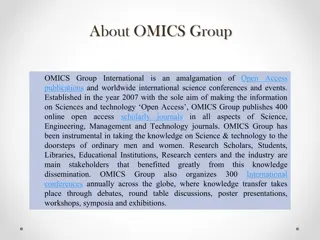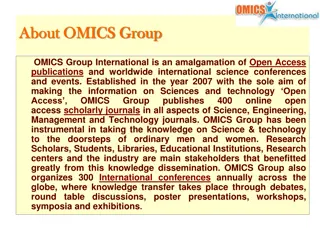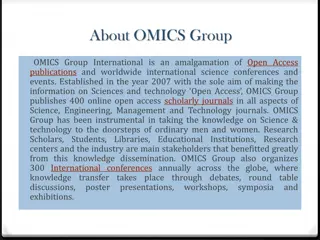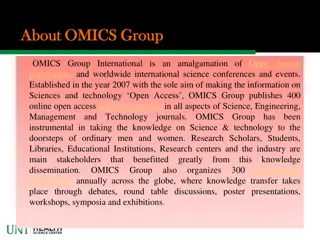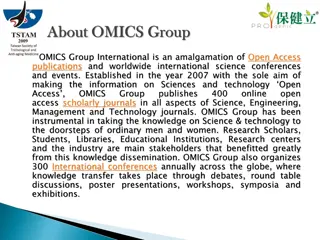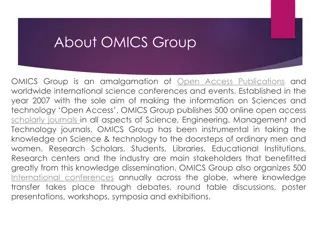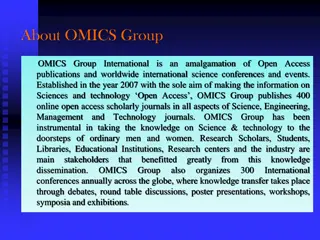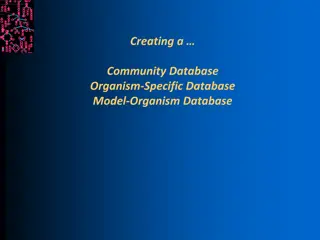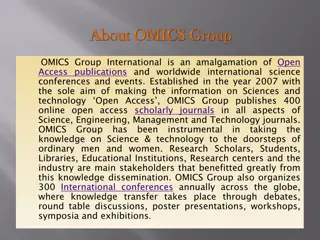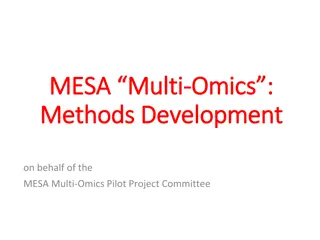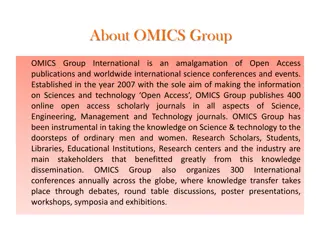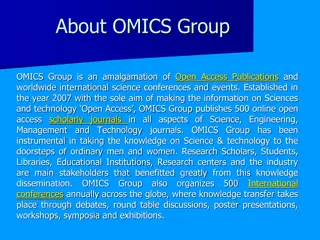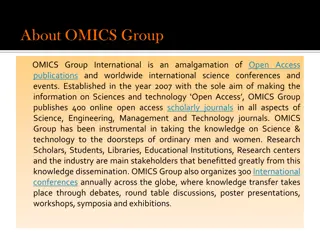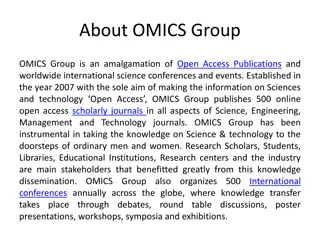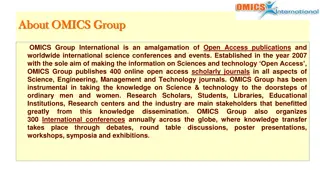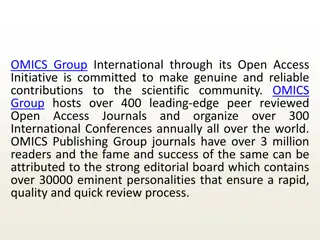About OMICS Group
OMICS Group International, established in 2007, publishes 400 online open access scholarly journals covering Science, Engineering, Management, and Technology. They also organize over 300 international scientific conferences annually, facilitating knowledge transfer through various platforms such as debates, workshops, and exhibitions. Learn about Forensic Pathology as a subspecialty of forensic medicine focused on determining causes of death and its significance in India.
Download Presentation

Please find below an Image/Link to download the presentation.
The content on the website is provided AS IS for your information and personal use only. It may not be sold, licensed, or shared on other websites without obtaining consent from the author.If you encounter any issues during the download, it is possible that the publisher has removed the file from their server.
You are allowed to download the files provided on this website for personal or commercial use, subject to the condition that they are used lawfully. All files are the property of their respective owners.
The content on the website is provided AS IS for your information and personal use only. It may not be sold, licensed, or shared on other websites without obtaining consent from the author.
E N D
Presentation Transcript
About OMICS Group About OMICS Group OMICS Group International is an amalgamation of Open Access publications and worldwide international science conferences and events. Established in the year 2007 with the sole aim of making the information on Sciences and technology Open Access , OMICS Group publishes 400 online open access scholarly journals in all aspects of Science, Engineering, Management and Technology journals. OMICS Group has been instrumental in taking the knowledge on Science & technology to the doorsteps of ordinary men and women. Research Scholars, Students, Libraries, Educational Institutions, Research centers and the industry are main stakeholders that benefitted dissemination. OMICS Group also conferences annually across the globe, where knowledge transfer takes place through debates, round table discussions, poster presentations, workshops, symposia and exhibitions. greatly organizes from this knowledge International 300
About OMICS Group Conferences About OMICS Group Conferences OMICS Group International is a pioneer and leading science event organizer, which publishes around 400 open access journals and conducts over 300 Medical, Clinical, Engineering, Life Sciences, Phrama scientific conferences all over the globe annually with the support of more than 1000 scientific associations and 30,000 editorial board members and 3.5 million followers to its credit. OMICS Group has organized 500 conferences, workshops and national symposiums across the major cities including San Francisco, Las Vegas, San Antonio, Omaha, Orlando, Philadelphia, Baltimore, United Kingdom, Valencia, Dubai, Beijing, Hyderabad, Bengaluru and Mumbai. Raleigh, Santa Clara, Chicago,
FORENSIC PATHOLOGY : PIVOT OF MEDICO-LEGAL SYSTEM Dr. S.K. Dhattarwal, Medico Legal Advisor to Govt. of Haryana Sr. Prof. & Head Department of Forensic Medicine PGIMS, Rohtak.
What is Forensic Pathology It is considered a subspecialty of forensic medicine in India. It is the application of pathology for the purpose of law and administration of justice. It focuses on determining the cause of death by examining a dead body. The methodology may vary depending upon the country of origin but the basic science and the aim remains the same.
Sir Conrad Spilsbury : The Father of Modern Forensic Pathology
In India it constitutes of two intermingled specialties of medical science: 1. Forensic medicine 2. Pathology Forensic medicine in India is relatively a younger branch which is slowly but surely gaining importance.
Who is a Forensic Pathologist? Forensic professionals. pathologist is to establish the cause of death in the deceased. In India Forensic Medicine is a separate specialty and deal with such cases. pathologists The are of trained forensic role a
What do they do? The determining all the aspects associated with a sudden death including: Cause of death Mode of death Manner of death work of a Forensic pathologist includes Examines and documents wounds and injuries, both at autopsy and occasionally in a clinical setting. Other responsibilities also include giving opinion regarding age, injury, sex and potency etc.
How do they do it A pathologist documents the facts and collect required samples which can aid in leading to a cause of death. They study and analyze physical evidence. It can also include a visit to the scene of crime which is done under medical examiner system as practiced in USA and is the best form of inquest. Serves as an expert witness in courts of law testifying in civil or criminal cases. examines the dead body,
Why do they do it A medico-legal autopsy is done on inquest which means an enquiry into the cause of death In India PME inquest is of 2 types: Police Inquest: held U/S 174 CrPC Magistrate Inquest: held U/S 176 CrPC
Duties of a Forensic Pathologist? To help determine the cause and manner of death. To collect samples and perform toxicological, microscopic, photographic, serologic and microbiological studies to reach to conclusion. Sometimes travel to the scene of the crime to collect evidence and scene reconstruction. the investigating agencies to radiological,
A forensic expert must also have working knowledge of several other non-medical sciences, this includes being able to apply areas of toxicology, firearms examination, trace evidence, forensic serology and DNA technology to their investigation into the death of the person involved.
Indian Medico-legal system Indian medico-legal system has flaws in its basic design:- Lack of any centralized guidelines: there are no set procedures of medico-legal work which often leads to confusion among agencies. Lack of properly trained experts: there is an acute shortage of trained individuals in the field of Forensic medicine.
Slow justice delivery: Indian judicial system is understaffed and overburdened due to which timely justice is often not served. Illegal medical practitioners: they give rise to unnecessary medical litigations and straining the already overburdened system Neglect on the part of policy making agencies: countrywide there is still a picture of neglect towards this aspect.
Why is Forensic Pathology so important now? In recent years due to increased public awareness and an aggressive media, forensic pathology has awaken keen interest among the masses. Now autopsy cases and medico-legal litigations have increased many folds in last few years. Now in the face of this trend the need for well trained forensic pathologist is felt more than ever.
In recent years forensic pathology has become more and more important because the judicial and the courts systems are relying more and more on the evidence and the conclusions forensic pathologists come up with in murder or suicide cases. This has led to a boom in the amount of courses available in the study of forensic science and analysis.
Forensic pathology is also very important in finding cures and vaccines for many diseases by finding out exactly how the infected person may have died, this examination of the body at autopsy, of tissues removed during surgery, and by analysis of fluids from the body, such as blood or urine, in the clinical pathology laboratory . Determining the exact cause of death is the first step to finding a cure. is done by the
Let Us Meet Again Let Us Meet Again We welcome you all to our future conferences of OMICS Group International Please Visit: www.omicsgroup.com www.conferenceseries.com
